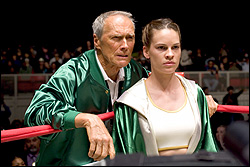You get two movies for the price of one in Million Dollar Baby (which opens Friday, Jan. 7, at the Meridian), and I prefer the more corny, clichéd first 90 minutes—a kind of distaff Rocky picture. That’s not the portion that’s putting it on so many 10-best lists for 2004 (though not my own); critics are mainly praising, indirectly, the very different 30 minutes that follow. Like the pugilist preamble, you’ve seen that flick before, too, and probably as a TV movie-of-the-week. After five decades in Hollywood, Clint Eastwood’s not into novelty. He’s never been one to push film form or content, and Baby—based on the ring story collection Rope Burns, by F.X. Toole (a pseudonym for boxing cornerman Jerry Boyd, now deceased)—could’ve been made when he first strolled onto the Universal Studios lot in the early ’50s. It’s a simple, unapologetic throwback made without fuss or flab. No CGI, no phony tears, no happy endings, no extra dialogue—these are certainly qualities to admire in Eastwood’s laconic direction. But such excellent command of film conventions doesn’t transform what is, in essence, very conventional material.
Nicely answering the question “Whatever happened to Hilary Swank?” the Bellingham-raised actress KO’s the series of undistinguished roles that followed her Oscar-winning breakout in Boys Don’t Cry. It really doesn’t matter how much physical training she did or how much muscle she gained for the role of Maggie Fitzgerald, Ozarks “trash” washed up in the L.A. boxing gym of Frankie Dunn (Eastwood); the main thing is that she looks convincingly fierce in the ring—as if she’s facing off against her recent career missteps. Pow! Take that, The Affair of the Necklace! Slam! Taste the canvas, The Core! Wham! Time for a nap, Insomnia! If there’s a promising new horizon for swaggering female action heroines in the mold of Jennifer Garner, Swank deserves her own tough-gal franchise. Who says the new James Bond needs to be a guy?
Turning Swank’s waitress into a champ requires not one but two wrinkly Yoda figures: In addition to narrating Baby with 1,001 boxing clichés (“People love violence. Boxing is about respect”), Morgan Freeman plays Scrap, a half-blind ex-boxer who helps out at Frankie’s gym. He’s the first to soften to Maggie, paving the way for cantankerous Frankie, who apparently has a long-lost wife and (now) adult daughter about Maggie’s age. Like the two old codgers in David Mamet’s The Duck Variations, this battered duo can literally have an extended conversation about the holes in Scrap’s socks—meaning the more time spent in the ring with Swank, the better.
Then there’s some blarney about Irish Catholic Frankie reading Yeats in Gaelic and hectoring his priest (Brian F. O’Byrne) about matters of faith. His stable of gym rats consists of cardboard palookas. He talks about pie with Maggie while sitting in the Hopperesque diners of Eastwood’s youth. We also meet her no-good trailer-park family; if she calls herself trash, what are they—compost? Again, you’d rather watch Swank taping her fists or lacing her gloves—something with a little excitement to it.
EASTWOOD’S SIGNAL quality as a director is his sparse restraint, so the boxing sequences aren’t particularly flashy. There’s maybe a bit of slo-mo photography here and there, but Baby‘s direction remains as low-tech as the typewriter-and-rotary-dial-phone Los Angeles in which it’s set. Eastwood trusts his actors sufficiently to resist any tricks; one reason the film has been so well received is because he respects the integrity of a performance unhurried by frivolous camera moves or brusque edits. The source material may not give him, Freeman, or Swank quite enough clay to sculpt great characters; their shape comes more from their familiarity. The movie’s no classic, but it’s made within the classical canon.
Part of Baby‘s humble appeal also comes from its—and, one suspects, Eastwood’s—working-class solidarity. Says Scrap of the dangers Maggie faces in the ring, “People die every day from mopping floors, washing dishes.” As she counts out her tip money to buy her own speed bag, there’s the sense of Barbara Ehrenreich’s Nickel and Dimed America. Though past 30, she’s willing to do the work and take the risks for her big break; it’s a case not just of earning a title shot against the fearsome German champ, but of taking her only shot out of obscurity and poverty. In part, this is the same drive that puts people on Fear Factor or American Idol, only Eastwood is concerned with the darkness offstage, the sadness before and after those 15 minutes of klieg-light glory.
His movie does abruptly turn on what might be called a narrative sucker punch, and it’s being implicitly praised for that decision (more than for what follows). Fair enough—credit is due an American filmmaker who can steer a Hollywood movie as uncompromisingly as Eastwood does. But Martin Scorsese also ends The Aviator in what might be called an unpopular direction, and that after some considerably more lively, thrilling prior footage.
Million Dollar Baby ultimately isn’t a fatalistic picture, in that it advances Eastwood’s career, and Swank’s, which ought to make any filmgoer hopeful after a not-so-great year at the movies. If it looks backward to traditional values and craft, and offers no concessions to focus groups or test screenings, that’s also commendable at a time when most movies are so timidly manufactured to please the majority. A one-man shop who even composed the muted score for his movie, Eastwood reminds us how films are best created, like Maggie’s destiny in the ring, with one’s own hands.








